高考英语情态动词讲解及习题(附答案)
高考英语情态动词知识点技巧及练习题附答案解析(6)
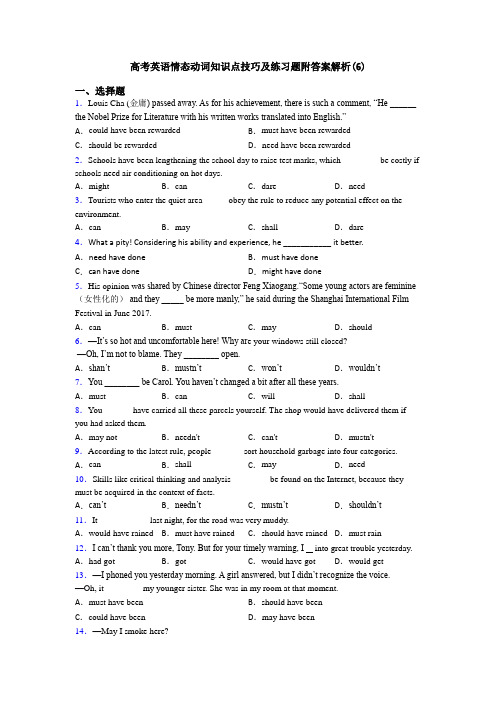
高考英语情态动词知识点技巧及练习题附答案解析(6)一、选择题1.Louis Cha (金庸) passed away. As for his achievement, there is such a comment, “He ______ the Nobel Prize for Literature with his written works translated into English.”A.could have been rewarded B.must have been rewardedC.should be rewarded D.need have been rewarded2.Schools have been lengthening the school day to raise test marks, which ________ be costly if schools need air conditioning on hot days.A.might B.can C.dare D.need3.Tourists who enter the quiet area _____ obey the rule to reduce any potential effect on the environment.A.can B.may C.shall D.dare4.What a pity! Considering his ability and experience, he ___________ it better.A.need have done B.must have doneC.can have done D.might have done5.His opinion w as shared by Chinese director Feng Xiaogang.“Some young actors are feminine (女性化的)and they _____ be more manly,” he said during the Shanghai International Film Festival in June 2017.A.can B.must C.may D.should6.—It’s so hot and uncomfortable here! Why ar e your windows still closed?—Oh, I’m not to blame. They ________ open.A.shan’t B.mustn’t C.won’t D.wouldn’t7.You ________ be Carol. You haven’t changed a bit after all these years.A.must B.can C.will D.shall8.You ______ have carried all these parcels yourself. The shop would have delivered them if you had asked them.A.may not B.needn't C.can't D.mustn't 9.According to the latest rule, people _______sort household garbage into four categories. A.can B.shall C.may D.need10.Skills like critical thinking and analysis ________ be found on the Internet, because they must be acquired in the context of facts.A.can’t B.needn’t C.mustn’t D.shouldn’t11.It ___________ last night, for the road was very muddy.A.would have rained B.must have rained C.should have rained D.must rain12.I can’t thank you more, Tony. But for your timely warning, I into great trouble yesterday. A.had got B.got C.would have got D.would get13.—I phoned you yesterday morning. A girl answered, but I didn’t recognize the voice.—Oh, it ________ my younger sister. She was in my room at that moment.A.must have been B.should have beenC.could have been D.may have been14.—May I smoke here?—If you _______, choose a seat in the smoking section.A.must B.should C.may D.can15.AI will surely be a feature of future life, but it _____ be used responsibly and in a proper way. A.can B.need C.must D.will16.Helen________ go on the trip with us, but she isn’t quite sure yet.A.shall B.may C.must D.can17.The lady ________ have done something wrong, because she is looking guilty.A.would B.should C.can D.must18.Tom told us that he ______ come to the party tonight, but he wasn’t sure about this.A.will B.would C.could D.might19.He plays basketball very well. He_________ it a lot.A.may practise B.must practiseC.must have practised D.should have practiced20.Word that you _________ enjoy a three-day holiday has come if you do complete the task on time.A.may B.should C.could D.shall21.—Is there a holiday recently?—There_____ be. It has been informed that we will continue to study for another three weeks. A.won’t B.mustn’t C.may not D.can’t22.As you worked late last night, you __________ have come this morning.A.may not B.can’t C.mustn’t D.needn’t 23.—Sorry, Mum! I failed the job interview again.—Oh, it's too bad. You________ have made full preparations.A.must B.can C.would D.should24.The heavy rain may ______ the landslide last night.A.accounts for B.accounted forC.have accounted for D.accounting for25.You ___________ a better mark, but you didn’t work hard.A.could have had B.would have had C.must have had D.must have【参考答案】***试卷处理标记,请不要删除一、选择题1.A解析:A【解析】【分析】【详解】考查情态动词+have done用法。
高考英语情态动词练习题50题答案解析
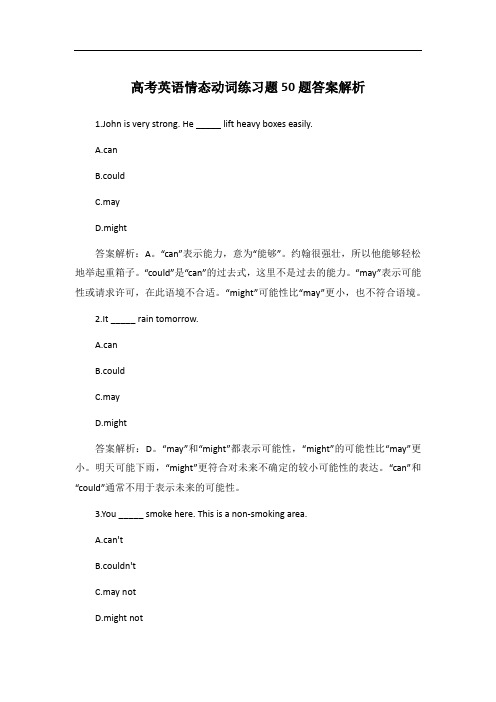
高考英语情态动词练习题50题答案解析1.John is very strong. He _____ lift heavy boxes easily.A.canB.couldC.mayD.might答案解析:A。
“can”表示能力,意为“能够”。
约翰很强壮,所以他能够轻松地举起重箱子。
“could”是“can”的过去式,这里不是过去的能力。
“may”表示可能性或请求许可,在此语境不合适。
“might”可能性比“may”更小,也不符合语境。
2.It _____ rain tomorrow.A.canB.couldC.mayD.might答案解析:D。
“may”和“might”都表示可能性,“might”的可能性比“may”更小。
明天可能下雨,“might”更符合对未来不确定的较小可能性的表达。
“can”和“could”通常不用于表示未来的可能性。
3.You _____ smoke here. This is a non-smoking area.A.can'tB.couldn'tC.may notD.might not答案解析:A。
“can't”表示不允许、禁止,这里是无烟区,所以不能吸烟。
“couldn't”是“can't”的过去式,这里不是过去的禁止。
“may not”和“might not”表示可能性的否定,不符合语境。
4.She _____ speak three languages.A.canB.couldC.mayD.might答案解析:A。
“can”表示能力,她能说三种语言。
“could”是“can”的过去式,这里不是过去的能力。
“may”和“might”表示可能性,不符合语境。
5._____ I borrow your pen?A.CanB.CouldC.MayD.Might答案解析:C。
“May I...?”表示请求许可,“can”也可用于请求许可,但语气比较直接,“may”更委婉。
人教版高考英语情态动词练习题50题含答案解析
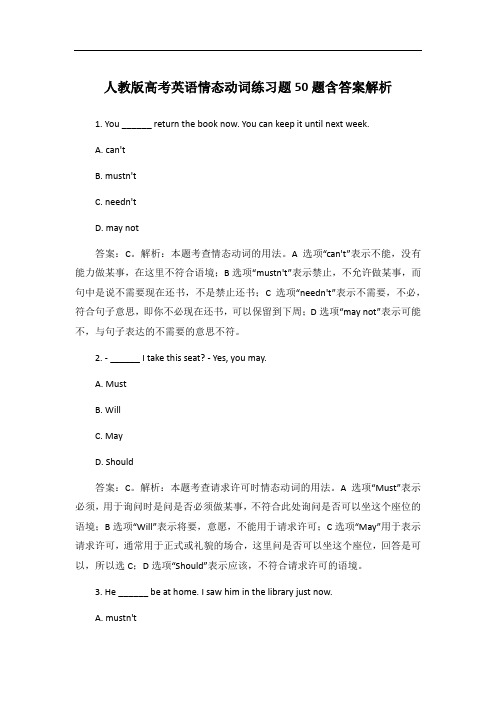
人教版高考英语情态动词练习题50题含答案解析1. You ______ return the book now. You can keep it until next week.A. can'tB. mustn'tC. needn'tD. may not答案:C。
解析:本题考查情态动词的用法。
A选项“can't”表示不能,没有能力做某事,在这里不符合语境;B选项“mustn't”表示禁止,不允许做某事,而句中是说不需要现在还书,不是禁止还书;C选项“needn't”表示不需要,不必,符合句子意思,即你不必现在还书,可以保留到下周;D选项“may not”表示可能不,与句子表达的不需要的意思不符。
2. - ______ I take this seat? - Yes, you may.A. MustB. WillC. MayD. Should答案:C。
解析:本题考查请求许可时情态动词的用法。
A选项“Must”表示必须,用于询问时是问是否必须做某事,不符合此处询问是否可以坐这个座位的语境;B选项“Will”表示将要,意愿,不能用于请求许可;C选项“May”用于表示请求许可,通常用于正式或礼貌的场合,这里问是否可以坐这个座位,回答是可以,所以选C;D选项“Should”表示应该,不符合请求许可的语境。
3. He ______ be at home. I saw him in the library just now.A. mustn'tB. can'tC. may notD. needn't答案:B。
解析:本题考查情态动词表示推测的用法。
A选项“mustn't”表示禁止,不是推测用法;B选项“can't”表示不可能,根据后面说我刚刚在图书馆看到他,所以他不可能在家,这种推测是基于事实的否定推测;C选项“may not”表示可能不,语气比较弱,没有“can't”那么肯定;D选项“needn't”表示不需要,不是推测用法。
高考必备英语情态动词技巧全解及练习题(含答案)
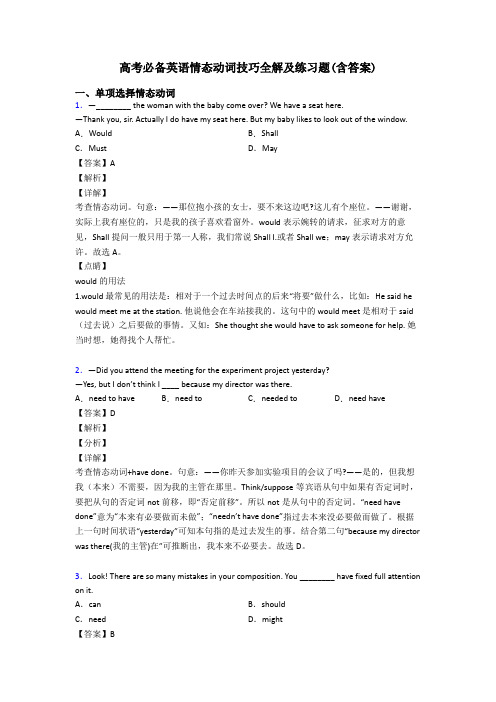
高考必备英语情态动词技巧全解及练习题(含答案)一、单项选择情态动词1.—________ the woman with the baby come over? We have a seat here.—Thank you, sir. Actually I do have my seat here. But my baby likes to look out of the window. A.Would B.ShallC.Must D.May【答案】A【解析】【详解】考查情态动词。
句意:——那位抱小孩的女士,要不来这边吧?这儿有个座位。
——谢谢,实际上我有座位的,只是我的孩子喜欢看窗外。
would表示婉转的请求,征求对方的意见,Shall提问一般只用于第一人称,我们常说Shall I.或者 Shall we;may表示请求对方允许。
故选A。
【点睛】would的用法1.would 最常见的用法是:相对于一个过去时间点的后来“将要”做什么,比如:He said he would meet me at the station. 他说他会在车站接我的。
这句中的 would meet 是相对于 said (过去说)之后要做的事情。
又如:She thought she would have to ask someone for help. 她当时想,她得找个人帮忙。
2.—Did you attend the meeting for the experiment project yesterday?—Yes, but I don’t think I ____ because my director was there.A.need to have B.need to C.needed to D.need have【答案】D【解析】【分析】【详解】考查情态动词+have done。
句意:——你昨天参加实验项目的会议了吗?——是的,但我想我(本来)不需要,因为我的主管在那里。
人教版高考英语情态动词练习题20题【含答案解析】

人教版高考英语情态动词练习题20题【含答案解析】1. You ______ be tired after such a long walk.A. canB. couldC. mustD. might答案解析:C。
“must”表示肯定的推测,意思是“一定”,在走了这么长的路之后,肯定会累,A 选项“can”表示能力或可能性;B 选项“could”是“can”的过去式,语气更委婉;D 选项“might”表示可能性较小的推测。
2. He ______ know the answer, but I'm not sure.A. mayB. mightC. canD. must答案解析:A。
“may”表示有可能,可能性比“might”大,“can”表示能力或可能性,“must”表示肯定的推测,这里说不确定,所以用“may”更合适。
3. We ______ go to the park if it is sunny tomorrow.A. canB. couldC. mayD. must答案解析:C。
“may”表示可能性,“can”和“could”更侧重于能力,“must”表示必须,这里说如果明天晴天可能去公园,用“may”。
4. She ______ speak French very well when she was young.A. canB. couldC. mayD. might答案解析:B。
“could”是“can”的过去式,这里说她年轻的时候,是过去的事情,用“could”。
5. They ______ be at home. The light is on.A. canB. couldC. mustD. might答案解析:C。
“must”表示肯定的推测,灯亮着,所以肯定在家,“can”“could”“might”都没有这么肯定的意思。
6. You ______ smoke here. It's forbidden.A. can'tB. couldn'tC. may notD. mustn't答案解析:D。
情态动词讲解及练习(含答案)
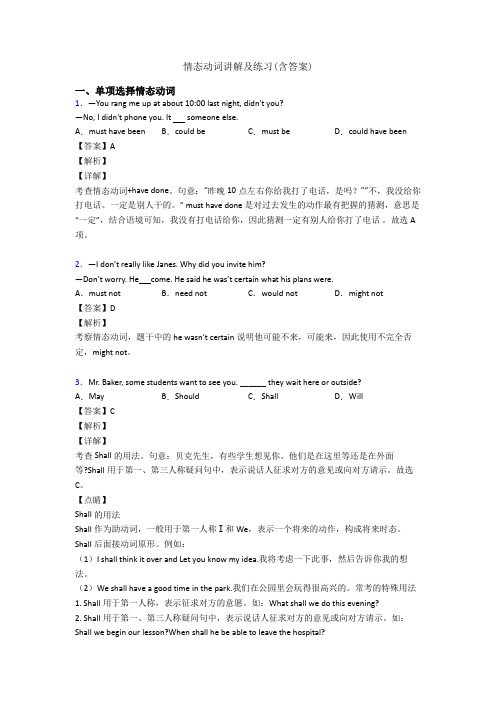
情态动词讲解及练习(含答案)一、单项选择情态动词1.—You rang me up at about 10:00 last night, didn't you?—No, I didn't phone you. It someone else.A.must have been B.could be C.must be D.could have been 【答案】A【解析】【详解】考查情态动词+have done。
句意:“昨晚10点左右你给我打了电话,是吗?”“不,我没给你打电话。
一定是别人干的。
” must have done 是对过去发生的动作最有把握的猜测,意思是“一定”,结合语境可知,我没有打电话给你,因此猜测一定有别人给你打了电话。
故选A 项。
2.—I don’t really like Janes. Why did you invite him?—Don’t worry. He come. He said he was’t certain what his plans were.A.must not B.need not C.would not D.might not【答案】D【解析】考察情态动词,题干中的he wasn’t certain说明他可能不来,可能来,因此使用不完全否定,might not。
3.Mr. Baker, some students want to see you. ______ they wait here or outside?A.May B.Should C.Shall D.Will【答案】C【解析】【详解】考查Shall的用法。
句意:贝克先生,有些学生想见你。
他们是在这里等还是在外面等?Shall用于第一、第三人称疑问句中,表示说话人征求对方的意见或向对方请示。
故选C。
【点睛】Shall的用法Shall作为助动词,一般用于第一人称Ⅰ和We,表示一个将来的动作,构成将来时态。
高考英语情态动词答题技巧及练习题(含答案)
高考英语情态动词答题技巧及练习题(含答案)一、单项选择情态动词1.It wasn’t right to me that such near neighbors not know one another.A.could B.wouldC.should D.might【答案】C【解析】【详解】考查情态动词。
句意:对我来说,很不正常,如此近的邻居居然不认识。
A. could可能,能够;B. would将;C. should竟然;D. might可能,也许。
should 作为情态动词,可以用来表示意外、惊喜或者在说话人看来是不可思议的,常常译为"竟会"、"居然",住的这么近的邻居居然不认识。
表示意外,所以答案选C。
【点睛】should的用法1、should 作为情态动词,通常用来表示现在或将来的责任或义务,译作“应该”、“应当”,这时它可以和 ought to, be supposed to 互换使用.例如:You should (= ought to ) tell your mother about it at once.2、should 作为情态动词,可以用在条件状语从句中,表示语气较强的假设,译作“万一”、“竟然”,这时也可将 should 置于从句之首,即将 should 放在主语前面,而省略从属连词 if。
例如:If you should fail to come, ask Mrs Chen to work in your place. (= Should you fail to come, ask Mrs Chen to work in your place. )3、should 作为情态动词,可以表示谦逊、客气、委婉之意,译为“可……”、“倒……”。
例如:I should say that it would be better to try it again.4、should 作为情态动词,可以用来表示意外、惊喜或者在说话人看来是不可思议的.尤其在以 why, who, how 等开头的修辞疑问句或某些感叹句中常常译为“竟会”、“居然”。
人教版高考英语情态动词练习题50题含答案解析
人教版高考英语情态动词练习题50题含答案解析1. You ______ be tired after working for eight hours without a break.A. canB. mayC. mustD. should答案解析:C。
must表示肯定的推测,根据题意,连续工作八小时不休息肯定会累,所以这里用must。
A选项can表示能力或可能性,通常用于否定和疑问句中表示推测,这里不适合。
B选项may表示可能性,但语气没有must肯定。
D选项should表示应该,不符合此处推测的语境。
2. ______ I use your pen? Mine is broken.A. CanB. MustC. ShouldD. May答案解析:D。
May用于请求许可,比较委婉,在这里是询问是否可以使用对方的笔。
A选项Can也可以表示请求许可,但相对May 来说比较口语化、直接。
B选项Must表示必须,不符合题意。
C选项Should表示应该,与请求许可无关。
3. He ______ speak English very well although he has never been to an English - speaking country.A. canB. mayC. mustD. should答案解析:A。
can表示能力,这里说他虽然没去过说英语的国家但是能把英语说得很好,强调能力。
B选项may表示可能性,这里不是在说可能性。
C选项must表示肯定的推测或者必须,不符合题意。
D选项should表示应该,与能力无关。
4. It ______ rain this afternoon. You'd better take an umbrella.A. canB. mayC. mustD. should答案解析:B。
may表示可能性,这里是说今天下午可能会下雨,只是一种不确定的推测。
【英语】高三英语情态动词解题技巧及练习题(含答案)含解析
【英语】高三英语情态动词解题技巧及练习题(含答案)含解析一、单项选择情态动词1.---Can I pay the bill by credit card?---Sorry, sir. But it is the management rules of our hotel that payment ______________ be made in cash.A.shall B.needC.will D.must【答案】A【解析】【详解】考查情态动词词义辨析。
A. shall用于法律法规或条文中,表示义务、规定等;B. need需要;C. will会;D. must必须。
句意:——我能用信用卡支付么?——对不起,先生,现金支付是我们酒店的管理规定。
故A项正确。
2.—Where is my dictionary?I remember I put it here yesterday.—You___it in the wrong place.A.must put B.should have putC.might put D.might have put【答案】D【解析】【详解】考查情态动词。
句意:——我的词典在哪里?我记得昨天放在这里了。
——你或许放错了地方。
“might have +动词+ed形式”表示过去可能完成的动作。
根据所提供的情景Where is my dictionary? I remember I put it here yesterday.可判断出把词典放在某个地方发生在过去,所以要用“might have +动词+ed形式”。
“should have + 动词+ed形式”表示“(过去)本来应该做某事”。
must意为“一定”,是肯定的推测,与所提供的情景的矛盾。
might put表示现在发生的事。
故选D。
3.—I don’t really like Janes. Why did you invite him?—Don’t worry. He come. He said he was’t certain what his plans were.A.must not B.need not C.would not D.might not【答案】D【解析】考察情态动词,题干中的he wasn’t certain说明他可能不来,可能来,因此使用不完全否定,might not。
高考英语高中必备英语情态动词技巧全解及练习题(含答案)
高考英语高中必备英语情态动词技巧全解及练习题(含答案)一、单项选择情态动词1.It wasn’t right to me that such near neighbors not know one another.A.could B.wouldC.should D.might【答案】C【解析】【详解】考查情态动词。
句意:对我来说,很不正常,如此近的邻居居然不认识。
A. could可能,能够;B. would将;C. should竟然;D. might可能,也许。
should 作为情态动词,可以用来表示意外、惊喜或者在说话人看来是不可思议的,常常译为"竟会"、"居然",住的这么近的邻居居然不认识。
表示意外,所以答案选C。
【点睛】should的用法1、should 作为情态动词,通常用来表示现在或将来的责任或义务,译作“应该”、“应当”,这时它可以和 ought to, be supposed to 互换使用.例如:You should (= ought to ) tell your mother about it at once.2、should 作为情态动词,可以用在条件状语从句中,表示语气较强的假设,译作“万一”、“竟然”,这时也可将 should 置于从句之首,即将 should 放在主语前面,而省略从属连词 if。
例如:If you should fail to come, ask Mrs Chen to work in your place. (= Should you fail to come, ask Mrs Chen to work in your place. )3、should 作为情态动词,可以表示谦逊、客气、委婉之意,译为“可……”、“倒……”。
例如:I should say that it would be better to try it again.4、should 作为情态动词,可以用来表示意外、惊喜或者在说话人看来是不可思议的.尤其在以 why, who, how 等开头的修辞疑问句或某些感叹句中常常译为“竟会”、“居然”。
- 1、下载文档前请自行甄别文档内容的完整性,平台不提供额外的编辑、内容补充、找答案等附加服务。
- 2、"仅部分预览"的文档,不可在线预览部分如存在完整性等问题,可反馈申请退款(可完整预览的文档不适用该条件!)。
- 3、如文档侵犯您的权益,请联系客服反馈,我们会尽快为您处理(人工客服工作时间:9:00-18:30)。
2016高考专题之情态动词一、基础提高一、常见的情态动词有:can 能may 可以will,would (表意愿)need 须要dare 敢must 必需have to 不得不shall,should 应当(表义务)ought to 应当1.can,could 的用法1.1表实力,有“能”、“会”、“能够”的意思例如:Can you drive a car? 你会开车吗?-----Yes, I can. 我会。
-----No, I can't. 我不会。
1.2表允许,在口语中代替may,有“可以”的意思例如:Can I use your bike?我可以用你的自行车吗?1.3表示可能性,常用于否定句和疑问句例如:Can it be true?那会是真的吗?Today is Sunday. He can't be at school.今日是星期天。
他不行能在学校里。
1.4过去式could表示的语气更加委婉、客气例如:Could I come to see you tomorrow?明天我可以来见你吗?1.5 can 和be able to 的比较1) can 只有一般现在时和一般过去时两种时态(could),其他时态要用be able to的形式例如:I haven't been able to get in touch with her.我始终没能和她联系上。
2) 通常can 和be able to 可以互换例如:He will come if he can.假如可能的话,他确定会来。
2.may,might的用法2.1表示许可或征求对方的许可,有“可以”的意思。
例如:You may go now.你可以走了。
May I use your computer?我用一下你的电脑可以吗?2.2回答以may开头的疑问句有如下表达法:例如:May I smoke here? 我可以在这儿抽烟吗?-----Yes, you may.-----Yes, please.------No, you can't.------No, you mustn't.------No, you'd better not.2.3表示揣测,通常只用于陈述句例如:You may be right.你可能是对的。
2.4过去式might表示的语气更加委婉、客气例如:Might I use your pen for a while?我能用用你的钢笔吗?2.5在口语中can可以代替may表示许可,但can 较随意,may更正式例如:Can I use your bike, John?约翰,我可以用一下你的自行车吗?May I have a look at your license please, sir?先生,我可以看一下你的执照吗3.must 的用法3.1表义务,“必需”例如:You must talk to them about their study.你必需同他们谈谈关于他们学习的事。
3.2在否定结构中表不许、禁止例如:You mustn't leave here.你不能离开这儿。
3.3表坚决的建议例如:You must come and see us as soon as you get to Shanghai.一到上海你就得立刻来见我们。
3.4表推想,暗含有很大的可能性例如:He must be ill. He looks so pale.他确定是病了。
他的脸色那么苍白。
[留意]may 暗含的可能性较小,must 暗含的可能性较大。
3.5关于must的简短回答:例如:Must I clean the dining room at once? 我必需立刻打扫餐厅吗?------Yes, you must.------No, you needn't.------No, you don't have to.4.have to的用法have to 虽属于情态动词,但它有人称、数的改变,它的疑问句否定句的构成也和其他情态动词有所不同。
4.1 have to表客观的须要和义务,must表主观相识例如:I missed the train, so I had to take a taxi.我没搭上火车,所以我只得打的。
4.2在疑问句和否定句中,have to多用助动词do构成,must则干脆提前或加not。
例如:Did he have to do it?他得做那件事吗?―――He didn't have to do it.他不须要做那件事。
4.3在否定句中,have to表示不须要,must表不允许。
例如:You don't have to go there.你不须要去那儿。
You mustn't go there?你不行去那儿。
4.4虽然must可以用在过去时态中,但是have to更能干脆了当的表达过去时间概念。
例如:She must see Hubert that very night.她必需在那个晚上见到休伯特。
I had to leave at six yesterday.我得在昨天6点离开。
5.need 的用法need既可用作情态动词,又可用作实义动词。
作情态动词时,没有数和人称的改变,后接动词原形;作实义动词时,有数的改变和人称的改变,后接带to 的不定式。
5.1用于否定句,表“不必”例如:You needn't worry.你不必担忧。
I don't think you need worry.我想你不必担忧。
5.2用于疑问句,表“须要吗”例如:Need you go? 你得去吗?-----No, I needn't. 不必。
-----Yes, I must. 是的,我必需去。
5.3 need用作实义动词时,要留意始终以实义动词的标准贯彻究竟例如:(正确)Do you need to go there?(错误)Do you need go there?6.will和would的用法6.1 will,用于构成将来时是助动词。
用于表示“意志”“决心”“恳求”是情态动词。
would亦同理。
例如:He'll be here this afternoon.今日下午他会来这儿。
(助动词)Will you tell her that I'm here?请您告知她说我在这儿,好吗?(情态动词)6.2用于各种人称,表示“意志”“决心”“承诺”例如:I will try.我愿一试。
6.3在疑问句中用于其次人称,提出恳求或询问例如:If you want help,let me know, will you?假如你须要帮助,让我知道,好吗?Will you type this, please?请打印这个,好吗?Won't you sit down?请坐下,好吗?6.4 would比will客气委婉例如:Would you help us, please?请您帮助我们,好吗?(表恳求)I'd go there with you.我要和你一块到那儿去。
(表意愿)Dad wouldn't allow it.爸爸不会允许这件事。
(表许可)7.shall和should的用法7.1 shall用于构成将来时是助动词,shall用于征求对方的看法,表示“决心”是情态动词例如:Perhaps I shall pay a visit to England this winter.可能今年冬天我会去英国观光。
(构成一般将来时,助动词)Shall I turn on the light, Mom?妈妈,我把灯打开好吗?(用于征求对方的看法,情态动词)I shall be there.我会到那儿去的。
(表“决心”,情态动词)7.2 should用于构成将来时是助动词。
should用于表示“应当”“揣测”是情态动词例如:We thought we should never see you again.我们以为再也见不到你了。
(构成一般过去将来时,助动词)I should write some letters tonight.今晚我得写几封信。
(表“应当”,情态动词)They should be there by now.他们现在可能到了。
(表“揣测”,情态动词)8.ought to的用法ought to 表示应当、理应做什么例如:You ought to clean the classroom , for it is your turn today.你应当把教室打扫了,因为今日是你值日。
9.情态动词表示“推想”的用法情态动词表示“推想”时,要记住以下两种推想和形式推想:①对过去发生动作或状态的推想;②对现在状态的推想。
两种形式:①用情态动词加完成时态表示对过去发生动作或状态的推想;②用情态动词加动词原型表示对现在发生动作或状态的推想。
详细用法如下:9.1 must have done表示过去确定做了什么,语气非常确定例如:You must have finished your work.你确定完成了你的工作。
9.2 can’t have done表示过去不行能做了什么,语气也比较确定(是上面的否定形式)例如:He can’t have gone to Beijing, for I had a talk with him just now.他不行能去过北京,因为我刚和他交谈过。
9.3 need n’t have done表示过去没有必要做什么但已经做了。
例如:You needn’t have come earlier. 你不须要来这么早的。
9.4 should have done过去该做什么但没有做。
(含有责怪的意思)。
例如:You should have started earlier.你本应当早点起先的。
9.5 shouldn’t have done表示过去不该做什么但做了。
(含有责怪的意思)例如:You shouldn’t have helped him, he could do it himself.你本不该帮助他的,他能自己做。
9.6 ought to have done表示过去该做什么而没有做。
(是职责和义务)例如:You ought to have helped him. (but you didn’t.)你应当帮助他的。
9.7 can/could do sth.表示对现在状况的揣测,常用于否定句、疑问句或感叹句中。
例如:This news can’t be true.这消息不行能是真的。
